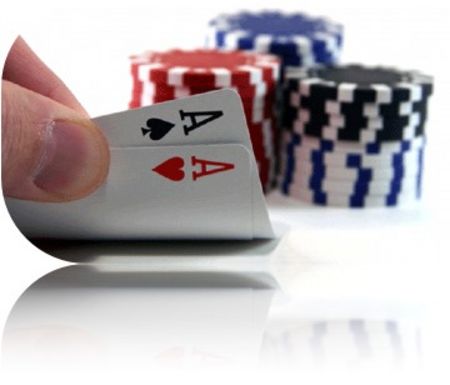The River

The river is a much different type of betting, round, as now all cards have been
shown. You either have a really strong hand, a busted draw, a medium holding, or a
decent hand with worries that an opponent hit a draw. Most players make quick
decisions on the river without thinking through the various possibilities. For
example, should you always bet out when you think you have the best hand? The
answer is no. Should you check and call a set when the board has four suited cards
or four connected cards? Sometimes you should bet out, yet most players make the
quick, most obvious decision, which is sometimes incorrect.
Betting correctly on the river is important as these are big bets and each bet made
or saved can significantly add to your earnings rate. Some players tend to back off
and lose betting opportunities when they are afraid someone has the nuts. Other
players call too often on the river, just so they can see their opponent's winning
hand. There are times when you can win the entire pot with a good bluff, or lose the
entire pot if you fold the winning hand. These types of mistakes can be very costly.
Think through each situation to be sure you have evaluated each possibility.
Don't Fold the Winning Hand
One of the most costly mistakes you can make in limit Hold'em is folding the
winning hand on the river. You should always realize that you are get-ting
significant pot odds to call. If there is $24 in the pot and you face a $4 bet, you only
need to win once every seven times for calling to be correct. With the good pot
odds, calling on the river is usually correct if you feel you have some chance of
winning, the hand.
The river is not the time to show your great hand reading skills and attempt to make
a great fold, unless you are extremely confident in your reading ability and
knowledge of your opponent. On the other hand, don't waste bets just to see your
opponent's hand when it is obvious that you are beat.
Let's look at some general considerations to help you determine if calling is correct.
One important consideration is the type of opponent you are against. You can fold
your weak hands with more confidence against a tight player who never bluffs than
if you are against a tricky player who is not so straight-forward. Against these tricky
players, evaluate all of the betting sequences in the hand to help determine if you
have some chance of winning.
Another important consideration is whether or not the bettor could have been on a
draw. An opponent playing a board of A ♣ 9 ♦ 4 ♥ 2 ♠ is likely to have a decent hand:
however, opponents might be playing a draw with flops that are two- or three-suited
or contain two connected or even two gapped cards. A weak hand can win if your
opponent is betting a busted draw.
For example, in a $10-$20 game you get a free play in the big blind against two
early callers with 6 ♣ 2 ♣ and a T ♣ 9 ♣ 3 ♦ flop. You decide to bet out as a semi-bluff
into your two opponents and one of them calls. The turn card is the 4 ♦. You decide
to bet again and your opponent calls. The river card is the 2 ♥. You check and your
opponent bets.
You will lose if your opponent has any pair, but you should call against most types
of opponents since they could have played an overcard, flush, or straight draw such
as K ♥ J ♠, Q ♦ J ♦,
or A ♣ 7 ♣. You only need to win once every six times in this
particular example for calling to be profitable.
When there are no obvious flush or straight draws on the board, you need to try to
determine the strength of your opponent's hand. Does he have top pair or better? Is
it possible that he was betting only overcards? Is it possible that he was betting a
low pair?
Evaluate all the betting sequences in the hand preflop, flop, and on the turn to help
you determine his possible hands. Once you have narrowed down the possibilities,
you can evaluate the probability that your hand will win. Even with a small
probability of winning, you might be justified in calling if you are receiving the proper
pot odds. Do not outsmart yourself and throw away the winning hand on the river.
Folding the winning hand on the river is one of the most costly mistakes you can
make as you lose the entire pot!
NEXT...Folding to Save Bets

